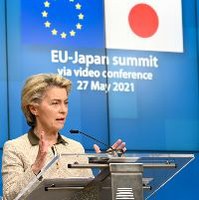(BRUSSELS) – The EU forged a first-ever ‘green alliance’ with Japan Thursday, vowing at a summit to speed up action on climate change, promote green growth and jobs, and achieve sustainable and secure energy supplies.
Commission chief Ursula von der Leyen and Council president Charles Michel were meeting via video conference with the Japanese Prime Minister Yoshihide Suga for the 27th EU-Japan Summit.
At the meeting,the EU welcomed Japan as one of the first countries that committed to climate neutrality in 2050. “They are, like the European Union, very committed to the long-term goals,” said Ms von der Leyen: “And we want to work much closer on this topic together. That is why we started the first ever Green Alliance with Japan.”
With both the EU and Japan sharing the aim of becoming climate-neutral by 2050. The Green Alliance will see both sides working together to ensure a successful outcome to COP26, and consensus on a realistic post-2020 global biodiversity framework at COP15.
The five priority areas for the Alliance will be:
- pursuing a cost-effective, safe and sustainable energy transition by adopting low-carbon technologies, including renewable energy, renewable hydrogen, energy storage, and carbon capture, utilisation and storage;
- strengthening environmental protection by promoting more sustainable, circular practices in production and consumption, and contributing to the global goal of protecting at least 30% of both land and sea in order to conserve biodiversity;
- increased regulatory cooperation and business exchange to drive global uptake of low-carbon technologies and environmental solutions that will accelerate the global transition to climate-neutral economies;
- consolidating existing collaboration on research and development in the areas of decarbonisation projects, renewable energy, and the bioeconomy;
- and maintaining both parties’ leadership on international sustainable finance to help converge on a definition of sustainable investments and ensure consistency and transparency about sustainability-related disclosures
Finally, the two partners agree to work together closely on the international stage to promote cooperation on climate action in developing countries. The partners will work to facilitate the transition to climate-neutral and resilient societies, including through phasing out government support for carbon-intensive fossil fuel energy, promoting international access to renewable energy, the exchange of information on mitigation and adaptation efforts, and support in the deployment of safe and sustainable low-carbon technologies.



